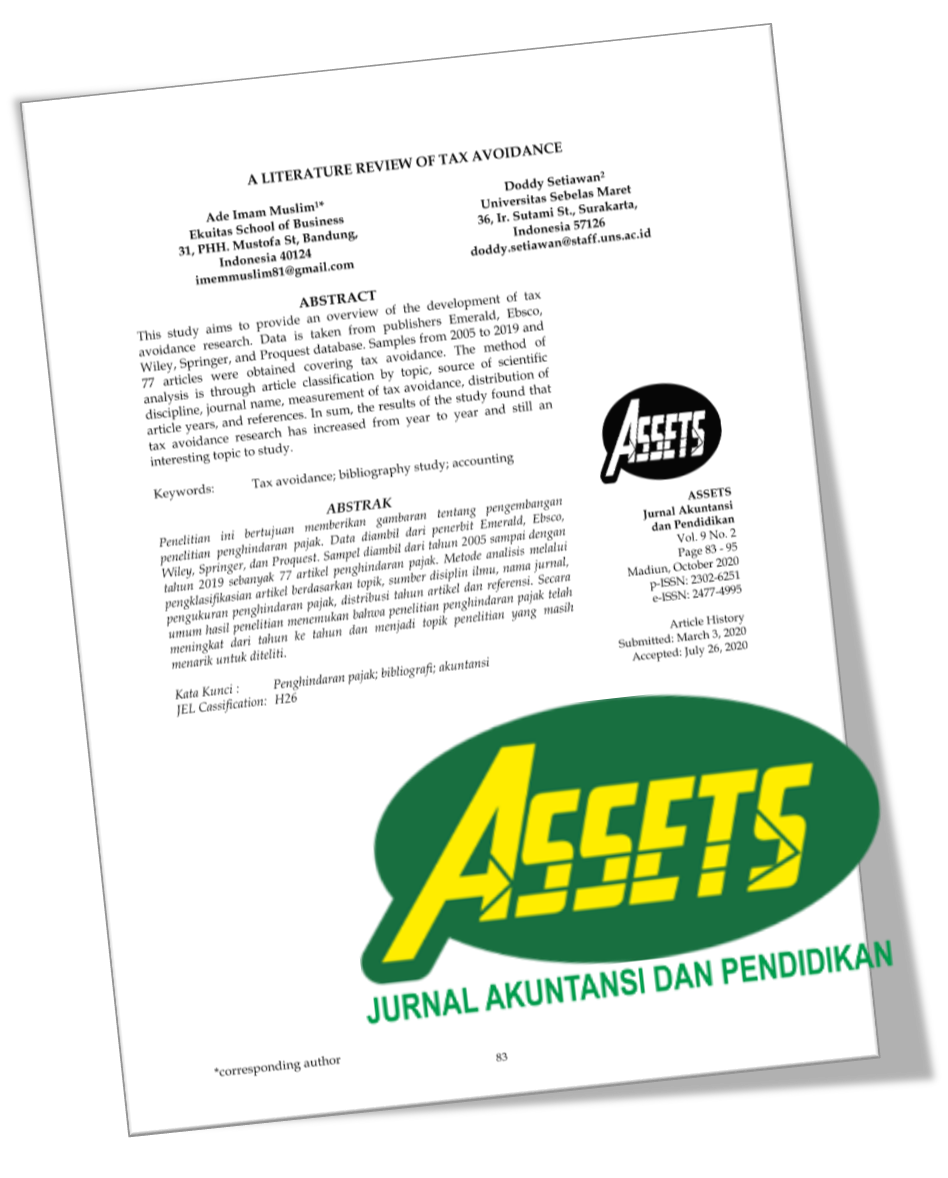LIFELONG LEARNERS ATTITUDE IN Z GENERATION
DOI:
https://doi.org/10.25273/jap.v12i2.15688Keywords:
Lifelong learner, Z Generation, Family, School, Social, Individual, Belajar sepanjang hayat, Generasi Z, Keluarga, Sekolah, Sosial, IndividuAbstract
ABSTRACT
This research aims to find the factors forming lifelong learner attitudes in the Z generation. The data collection is using the Google Forms platform. The data analysis technique is Structural Equation Modeling (SEM) through the Lisrel 8.80 program. The results show that factors that influence the attitude of this lifelong learner include family, school, social, and individual factors. Indicators of family factors include inspiration, aspirations, and family attention. School factors are formed from indicators of the teaching quality of lecturers, class facilities, and university facilities. Social factor indicators include social needs, community support, and government support, while individual factors are formed from future orientation, self-efficacy, and internal locus of control.
ABSTRAK
Penelitian ini bertujuan untuk mencari faktor pembentuk sikap lifelong learner pada generasi Z. Pengambilan data menggunakan platform google form. Pengujian hipotesis menggunakan teknik analisis data Stuctural Equation Modeling (SEM) melalui program Lisrel 8.80. Hasil penelitian menunjukkan faktor yang mempengaruhi sikap lifelong learner meliputi faktor keluarga, sekolah, sosial, dan individu. Indikator faktor keluarga meliputi inspirasi, aspirasi, dan perhatian keluarga. Faktor sekolah dibentuk dari indikator kualitas pengajaran dosen, fasilitas kelas, dan fasilitas universitas. Indikator faktor sosial meliputi kebutuhan sosisal, dukungan masyarakat, dan dukungan pemerintah, sedangkan faktor individu dibentuk dari orientasi masa depan, self efficacy, dan locus of control internal.
Downloads
References
Ayçiçek, B. (2021). Investigation of university students’ lifelong learning tendencies in terms of various variables. African Educational Research Journal, 9(1), 121–133. https://doi.org/10.30918/aerj.91.20.218
Bulbul, A. (2020). Examination of Lifelong Learning Trends of Physical Education and Sports Teachers on Different Variables. Journal of Education and Learning, 9(6), 94. https://doi.org/10.5539/jel.v9n6p94
Chen, Z., & Liu, Y. (2019). The different styles of lifelong learning in China and the USA are based on influencing motivations and factors. International Journal of Educational Research, 95(November 2018), 13–25. https://doi.org/10.1016/j.ijer.2019.03.005
Coşkun, Y. D., & Demirel, M. (2012). Lifelong Learning Tendencies of University Students. Hacettepe Üniversitesi Eğitim Fakültesi Dergisi, 42(November), 108–120.
Dindar, H., & Bayrakcı, M. (2015). Factors Affecting Students' Lifelong Learning in Higher Education. International Journal on Lifelong Education and Leadership, 1(1), 11–20. https://doi.org/10.25233/ijlel/2015-v1i1p2
Firman, H. (2019). Pembelajaran Kimia Bagi Generasi Z di Era Industri 4.0. Scholae, 1–8.https://scholae.co/web/read/2590/pembelajaran.kimia.bagi.generasi.z.di.era.industri. Seminar Nasional "Revolusi Belajar Generasi Z Menyongsong Industri 4,0" tanggal 11 Februari 2019, Bengkulu: FKIP Universitas Bengkulu
Gur Erdogan, D., & Arsal, Z. (2016). The Development of Lifelong Learning Trends Scale (LLLTS). Sakarya University Journal of Education, 6(1), 114. https://doi.org/10.19126/suje.32361
Haryono, S. (2016). METODE SEM Untuk Penelitian Manajemen. Jakarta: PT Intermedia Personalia Utama
Hastini, L. Y., Fahmi, R., & Lukito, H. (2020). Apakah Pembelajaran Menggunakan Teknologi dapat Meningkatkan Literasi Manusia pada Generasi Z di Indonesia? Jurnal Manajemen Informatika (JAMIKA), 10(1), 12–28. https://doi.org/10.34010/jamika.v10i1.2678
Hoerniasih, N. (2019). Lifelong Learning Dalam Pemberdayaan Masyarakat Untuk Kemandirian Berwirausaha. Indonesian Journal Of Adult and Community Education, 1(1), 31–39.
Hulukati, W., & Djibran, M. R. (2018). Analisis Tugas Perkembangan Mahasiswa Fakultas Ilmu Pendidikan Universitas Negeri Gorontalo. Jurnal Bikotetik (Bimbingan Dan Konseling Teori Dan Praktik), 2(1), 73. https://doi.org/10.26740/bikotetik.v2n1.p73-80
Hursen, C. (2016). A scale of lifelong learning attitudes of teachers: The development of LLLAS. Cypriot Journal of Educational Sciences, Volume 11, Issue 1, (2016) 21-36
İbrahim HASESKİ, H. (2020). Factors That Affect the Lifelong Learning of Older Male Individuals: A Case of Derminci in Turkey. International Journal of Eurasian Education and Culture, 5(9), 593–641. https://doi.org/10.35826/ijoecc.67
Lavrijsen, J., & Nicaise, I. (2017). Systemic obstacles to lifelong learning: the influence of the educational system design on learning attitudes. Studies in Continuing Education, 39(2), 176–196. https://doi.org/10.1080/0158037X.2016.1275540
Leonardi, T., & Wulandari, R. (2015). Pengaruh Kepercayaan Epistemologis Terhadap Kecenderungan untuk Lifelong Learning Pada Calon Guru. Jurnal Psikologi Pendidikan Dan Perkembangan, Volume 4 N. https://eur-lex.europa.eu/legal-content/PT/TXT/PDF/?uri=CELEX:32016R0679&from=PT%0Ahttp://eur-lex.europa.eu/LexUriServ/LexUriServ.do?uri=CELEX:52012PC0011:pt:NOT
Lukum, A. (2019). Pendidikan 4.0 Di Era Ggenerasi Z: Tantangan Dan Solusinya. Pros.Semnas KPK, 2, 13.
MaÅ¡ić, M., Zovko, A., & KovaÄić Samaržija, T. (2016). Attitudes of Pupils and Students Towards Lifelong Learning. AndragoÅ¡ka Spoznanja, 22(4), 93–110. http://dx.doi.org/10.4312/as.22.4.93-110
Nasution, A. K. P. (2020). Integrasi Media Sosial Dalam Pembelajaran Generasi Z. Jurnal Teknologi Informasi Dan Pendidikan, 13(1), 80–86. https://doi.org/10.24036/tip.v13i1.277
Nguyen, L., Luu, P., & Ho, H. (2020). Factors Influencing Life-Long Learning: An Empirical Study of Young People in Vietnam. Journal of Asian Finance, Economics and Business, 7(10), 909–918. https://doi.org/10.13106/jafeb.2020.vol7.no10.909
Sari, D. M., & Ashadi, A. (2020). Graduate students' attitudes and self-directed for lifelong learning in the foreign language environment. LingTera, 7(1), 38–50. https://doi.org/10.21831/lt.v7i1.32971
Soratana, N., Ratana-Ubol, A., & Kimpee, P. (2021). A process of lifelong learning in Thai family culture. Kasetsart Journal of Social Sciences, 42(3), 509–514. https://doi.org/10.34044/j.kjss.2021.42.3.09
Yoanita, D. (2022). Pola Komunikasi Keluarga Di Mata Generasi Z. Scriptura, 12(1), 33–42. https://doi.org/10.9744/scriptura.12.1.33-442
Yunus, J., Musa, K., & Mansor, M. (2020). Pengaruh faktor kendiri dan institusi mempengaruhi minat mengikuti program pembelajaran sepanjang hayat PPGB-JAIS-UPSI. Malaysian Journal of Society and Space, 16(1), 95–111. https://doi.org/10.17576/geo-2020-1601-08
Downloads
Published
Issue
Section
License
Perjanjian Lisensi dan Hak Cipta
Saat mengirimkan naskah ke jurnal, penulis menyatakan bahwa:
- Mereka diberi wewenang oleh rekan penulisnya untuk masuk ke dalam perjanjian ini.
- Karya yang dimaksud belum pernah diterbitkan secara resmi sebelumnya, kecuali dalam bentuk abstrak atau sebagai bagian dari kuliah, resensi, tesis, atau overlay jurnal yang diterbitkan.
- Karya yang dimaksud tidak sedang dipertimbangkan untuk diterbitkan di tempat lain,
- Publikasi karya yang dimaksud telah disetujui oleh semua penulis dan oleh otoritas yang bertanggung jawab - secara tahu sama tahu atau eksplisit - dari lembaga tempat pekerjaan itu dilakukan.
- Mereka mengamankan hak untuk mereproduksi materi apa pun yang telah diterbitkan atau dilindungi hak cipta di tempat lain.
- Mereka menyetujui lisensi dan perjanjian hak cipta berikut.
Hak Cipta
Penulis yang menerbitkan dengan ASSETS: Jurnal Akuntansi dan Pendidikan menyetujui persyaratan berikut:
- Penulis mempertahankan hak cipta dan memberikan jurnal hak publikasi pertama dengan karya yang secara bersamaan dilisensikan di bawah Lisensi Atribusi Creative Commons (CC BY-SA 4.0) yang memungkinkan orang lain untuk berbagi karya dengan pengakuan kepenulisan karya dan publikasi awal di jurnal ini.
- Penulis dapat masuk ke dalam pengaturan kontrak tambahan yang terpisah untuk distribusi non-eksklusif dari versi jurnal yang diterbitkan dari karya tersebut (misalnya, mempostingnya ke repositori institusional atau menerbitkannya dalam sebuah buku), dengan pengakuan publikasi awalnya di jurnal ini.
- Penulis diizinkan dan didorong untuk memposting karya mereka secara daring (misalnya di repositori institusional atau di situs web mereka) sebelum dan selama proses pengiriman, karena dapat menghasilkan pertukaran yang produktif, serta kutipan lebih awal dan lebih besar dari karya yang diterbitkan.
License and Copyright Agreement
In submitting the manuscript to the journal, the authors certify that:
- Their co-authors authorize them to enter into these arrangements.
- The work described has not been formally published before, except as an abstract or part of a published lecture, review, thesis, or overlay journal.
- That it is not under consideration for publication elsewhere,
- That its publication has been approved by all the author(s) and by the responsible authorities – tacitly or explicitly – of the institutes where the work has been carried out.
- They secure the right to reproduce any material already published or copyrighted elsewhere.
- They agree to the following license and copyright agreement.
Copyright
Authors who publish with ASSETS: Jurnal Akuntansi dan Pendidikan agree to the following terms:
- Authors retain copyright and grant the journal right of first publication with the work simultaneously licensed under a Creative Commons Attribution License (CC BY-SA 4.0) that allows others to share the work with an acknowledgment of the work's authorship and initial publication in this journal.
- Authors can enter into separate, additional contractual arrangements for the non-exclusive distribution of the journal's published version of the work (e.g., post it to an institutional repository or publish it in a book), with an acknowledgment of its initial publication in this journal.
- Authors are permitted and encouraged to post their work online (e.g., in institutional repositories or on their website) before and during submission, as it can lead to productive exchanges and earlier and more extraordinary citations of published work.

ASSETS: Jurnal Akuntansi dan Pendidikan is licensed under a Creative Commons Attribution-ShareAlike 4.0 International License.










